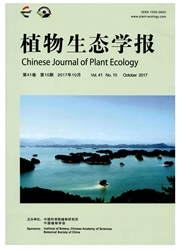

 中文摘要:
中文摘要:
以甘蓝型欧洲油菜(Brassica napus)‘814’和‘湘油15’两个品种为研究对象,探寻在两个CO2浓度(自然CO2浓度:400μmol·mol–1和高CO2浓度:(800±20)μmol·mol–1)和两个氮素水平(低氮和常氮)处理下,欧洲油菜韧皮部汁液中可溶性糖和游离氨基酸含量,以及根部干物质量和氮素累积量的变化。结果表明:1)CO2浓度升高提高欧洲油菜韧皮部汁液可溶性糖含量,施氮条件下‘814’在抽薹期达到0.29%,‘湘油15’在盛花期达到0.25%,其含量均显著高于自然CO2浓度处理。2)CO2浓度对韧皮部汁液游离氨基酸含量的影响因品种而异,无论施氮与否,CO2浓度升高使‘814’的游离氨基含量降低;而‘湘油15’CO2浓度升高促使其在低氮条件下含量升高,在常氮条件下则降低。3)根部干物质量和氮素累积量均随CO2浓度升高而增加,且欧洲油菜韧皮部汁液中可溶性糖含量与游离氨基酸含量与根部干物质量和氮素累积量呈显著正相关。
 英文摘要:
英文摘要:
Aims The rising global atmospheric CO2 concentration has become an indisputable fact. It will like to impose significant impacts crops. Our objective was to study the effects of elevated CO2 concentration on soluble sugars and free amino acids in the phloem sap and nitrogen(N) accumulation in roots. Methods Two oilseed rape(Brassica napus) varieties, ‘814' and ‘Xiangyou 15', were chosen in this study, and the soluble sugars and free amino acids in the phloem sap and nitrogen accumulation in roots were measured under two CO2 concentrations(normal: 400 μmol·mol–1, elevated:(800 ± 20) μmol·mol–1) and two N application levels(without N application, normal N application). Important findings The result shows that: 1) Soluble sugars in the phloem of oilseed rape were increased in the elevated CO2 treatment. With N application, the soluble sugar content reached 0.29% in ‘814' at the bolting stage, and reached 0.25% in ‘Xiangyou 15' at the flowering stage; both genotypes had greater soluble sugar content under elevated CO2 concentration and under the normal CO2 treatment. 2) Free amino acids in the phloem of oilseed rape were reduced by elevated CO2 treatment with or without N application in ‘814'. In the treatment without N application, the free amino acids in the phloem of ‘Xiangyou 15' were increased by 1.87%, 40.43%, 11.01%, and 224.90% under elevated CO2 at seedling stage, bolting stage, flowering stage, and silique stage, respectively; Whilst with normal N application, the percentage of increases was as high as 7.17%, 29.73%, 15.13%, and 5.38%, respectively. 3) Dry weight and N accumulation of roots were increased by elevated CO2 treatment. It is demonstrated that the soluble sugars and free amino acids in phloem are positively related to the dry weight and N accumulation of roots.
 同期刊论文项目
同期刊论文项目
 同项目期刊论文
同项目期刊论文
 期刊信息
期刊信息
